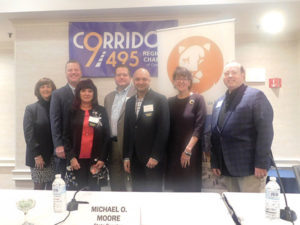By Bonnie Adams
Managing Editor

Westborough – Over 200 members of the business community attended the annual Corridor 9/495 Regional Chamber of Commerce Legislative Breakfast held Jan. 31 at the Doubletree Hotel, which featured a panel of local state officials discussing the pressing issues facing the state.
Mark Donahue, of Fletcher Tilton PC, moderated a discussion that included state senators Michael Moore (D-Millbury), Jamie Eldridge (D-Acton), and Harriette Chandler (D-Worcester) and state representatives Hannah Kane, (R-Shrewsbury) and Danielle Gregoire (D-Marlborough).
The panelists answered a number of diverse questions on issues, which, they noted, were actually all connected in one form or another.
Affordable housing, not just for lower income residents, but also the so-called “workforce housing” continues to be problematic, the legislators noted.
Eldridge noted that it was “important to keep a focus on the middle class families” who often found themselves priced out of certain markets.
“And there are not enough options for Baby Boomers who want to stay in their communities,” he added.
Chandler said that the part of that problem was zoning.
“We have 351 communities and 351 zoning plans,” she said. “We look upon local zoning as sacred. We can’t get the housing we need.”
“Please look within and work with us,” she asked the audience members. “We need to be much more open – I am almost begging you now. We can solve a lot of problems if we can provide more housing.”
Climate change was another issue the legislators discussed and in particular, its relation to transportation.
“The Northeast is the most vulnerable part of the country regarding climate change,” Eldridge said. “Massachusetts’s strength is in the ‘green economy’. We need to be bold and be leaders as far as climate change goes.”
“We need more people to take public transportation. But it needs to be effective,” Kane said.
“It’s important to reduce gashouse emissions. But we can’t do it alone. We need to partner with other states,” she added.
The legislators also discussed workforce issues such as proving affordable education for vocational students and those who wished to work in the important bio-tech industry.
The current Chapter 70 program, which provides state aid to public elementary and secondary schools and establishes minimum spending requirements for each school district and minimum requirements for each municipality’s share of school costs, was long overdue for an overhaul, they all agreed.
“We have great disparities between communities now,” Kane said. “We need to make sure whatever zip code you live in, you have every opportunity to get a great education. All legislators know how important this is.”
“The goal is equity – no matter where you live,” Chandler said. “We don’t have natural resources here – we have brainpower. And that’s why companies come here to Massachusetts.”
Gregoire noted that transportation was also a critical component.
She noted that three of the towns in the Corridor 9/495 region – Marlborough, Northboroough and Westborough – were on the borders of two major transit systems (Framingham and Worcester) yet residents from those communities could not utilize them.
“I think it’s an equity issue just like education,” she said. “We have to find a way to get people here.”

















